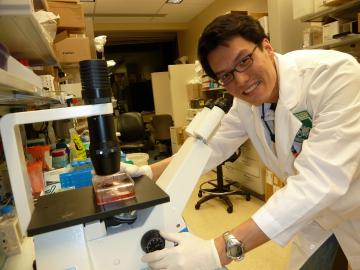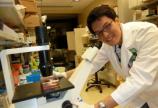Joining the fight against cancer
- Robie Liscomb

Eric Tran has known since high school that he wanted to use science to improve people's lives. Now, as the first student to complete the doctoral program in cancer immunology at the BC Cancer Agency's Deeley Research Centre (DRC), he's in a position to do just that. Tran has recently begun postdoctoral work at the US National Institutes of Health in Bethesda, MD, with Dr. Steven Rosenberg, an internationally recognized leader in T-cell therapy of cancer.
Tran describes his career progress in terms of the people who've inspired and supported him along the way.
"I had a couple of great science teachers in high school," says Tran, who grew up in Ucluelet. "And so after graduating, I knew that I wanted to do science; but science encompassed so many different subjects. What I did know was that I wanted to use science to help people."
While a UVic undergrad, he attended lectures in introductory immunology by Dr. Terry Pearson, and, says Tran, "The immune system became the coolest thing in the world. It fascinated me because I saw it as our protector, fighting microscopic battles and wars within our bodies 24/7, to keep us safe from harmful things like bacteria and viruses."
Then another lecturer inspired Tran: Dr. Brad Nelson, founding director of the DRC and an adjunct professor in UVics biochemistry department.
"He told us that the immune system could destroy cancers, and that he was opening up a lab to study tumor immunology. From that point on, I knew that I wanted to study ways to harness the immune system to help the fight against cancer," says Tran. He applied to the new cancer immunology graduate program at the DRC, which is available to students from UVic and UBC, and was accepted.
There, Tran conducted doctoral research relevant to T-cell therapy of cancer, which is the use of T cells (a type of white blood cell) to fight cancers, and involves the delivery of a large "army" of cancer-reactive T cells into a patient. Tran studied how T cells grow and proliferate, and also investigated whether certain proteins could boost the ability of T cells to destroy ovarian cancer cells.
Tran is thrilled to be working as a postdoc at the NIH with Rosenberg, who, for over 20 years, has been using T cells to treat patients with late-stage, incurable cancers, predominantly metastatic malignant melanoma—the deadliest form of skin cancer—with some positive results. In fact, says Tran, "a small subset of these 'incurable' patients can be cured with T-cell therapy; however, a large proportion is still succumbing to their disease—there's still a lot of work to be done."
"I hope to develop ways to improve T-cell therapy, as well as learn how to translate promising results seen in the lab to successful human clinical trials," says Tran. "After my training at the NIH, I would like to join a team of researchers and clinicians who are dedicated to designing and evaluating potent new immunotherapies for the treatment of cancer."

